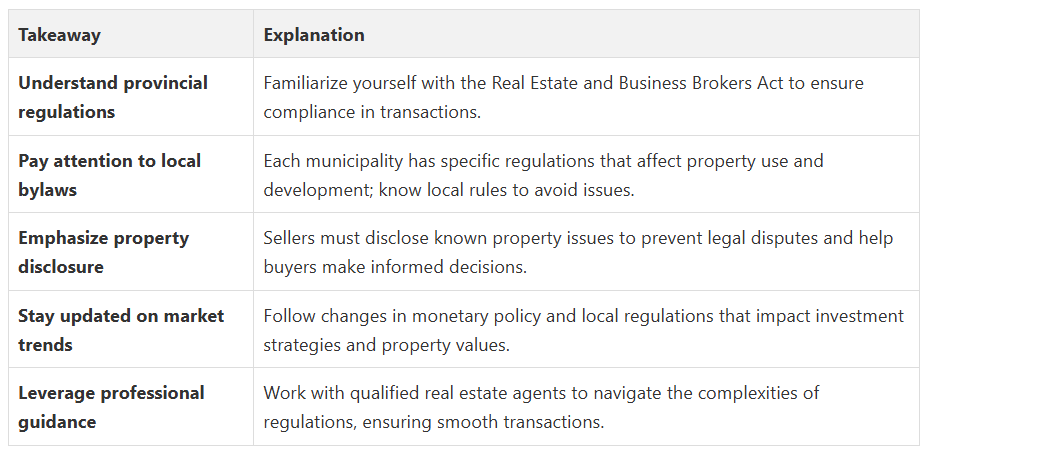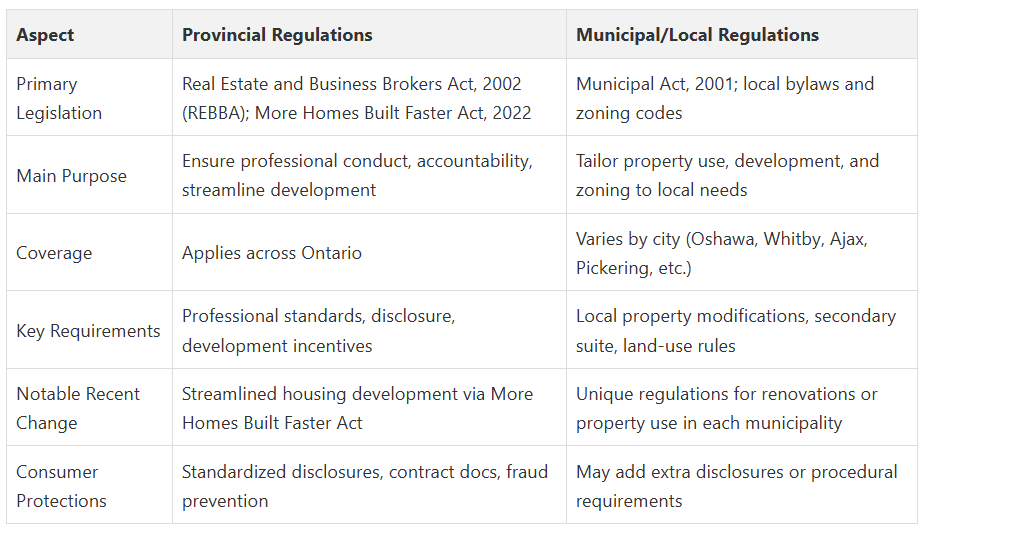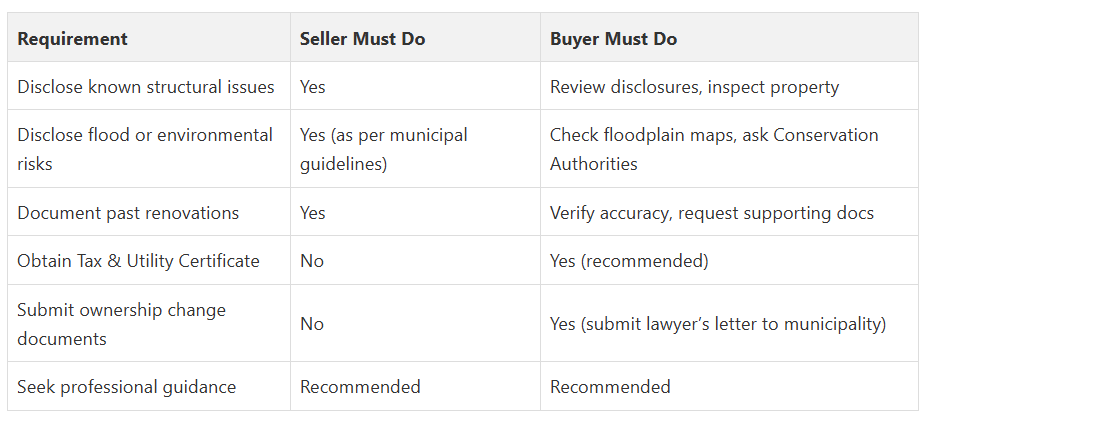
Current Real Estate Regulations in Toronto and Durham
Real estate rules in Toronto and Durham are changing faster than most people realize. Recent updates like the More Homes Built Faster Act have already shifted how homes are bought, sold, and developed across the region. Yet even with sweeping changes, most buyers and sellers are shocked to find that property bylaws can vary widely block by block, and just one missed disclosure can trigger a lawsuit or freeze a deal. Instead of relying on broad headlines, it is the local twists and unexpected fine print that catch even seasoned investors off guard.
Quick Summary

Overview of Current Real Estate Regulations
Provincial Regulatory Framework
The More Homes Built Faster Act, 2022, represents a significant recent development in Ontario’s real estate regulations. This legislation aims to address housing supply challenges by streamlining development processes across Toronto, Pickering, Oshawa, Whitby, Ajax, and surrounding areas. The act introduces key changes that impact how municipalities approach residential development, including provisions that remove certain municipal design controls and provide incentives for housing construction.
Municipal and Local Regulations
Homeowners and investors must pay close attention to local bylaws that can significantly impact property use, renovations, and potential development. For instance, cities like Oshawa and Whitby may have specific regulations regarding property modifications, secondary suites, and land use that differ from broader provincial guidelines.
To help you compare how regulations and processes differ across levels of government, the following table summarizes the main features of provincial versus municipal real estate regulations in Toronto and Durham Region.

Regulatory Compliance and Consumer Protection
Key regulatory protections include mandatory property disclosures, standardized contract documentation, and oversight mechanisms that help prevent fraudulent or unethical practices in the real estate market. These regulations are particularly important in dynamic markets like Toronto and Durham Region, where property values and market conditions can change rapidly.
Navigating these regulations requires careful attention to detail and often professional guidance. Whether you’re a first-time homebuyer in Oshawa or an experienced investor in the Durham Region, understanding the current real estate regulations is essential to making informed and legally compliant property decisions.
Key Rules for Homebuyers and Sellers
Property Disclosure and Legal Requirements
The Region of Durham emphasizes the importance of comprehensive property disclosure, particularly regarding potential environmental risks. Research from Durham’s municipal guidelines recommends that sellers fully disclose any known flood risks or historical flooding incidents. Buyers are advised to consult local floodplain viewers and contact Conservation Authorities to obtain detailed property risk assessments.
Sellers must provide accurate documentation about the property’s condition, including any known structural issues, past renovations, and potential environmental concerns. This transparency helps prevent future legal disputes and ensures buyers make informed decisions.
Understanding what each party (buyer or seller) is responsible for during a home transaction helps reduce risks and ensure legal compliance. The following table clarifies the key disclosure and legal requirements for buyers and sellers in Toronto and Durham Region.


Financial and Tax Considerations
Buyers should obtain a Tax and Utility Certificate to verify the current status of property-related accounts. New property owners must submit a lawyer’s letter with detailed ownership information to update property tax accounts, ensuring timely payments and avoiding potential penalties.
Additionally, the Durham Region has implemented updated Development Charges (DC) rates as of July 1, 2023. These charges fund growth-related capital costs for essential services like water, wastewater, and transportation. The Medium and High-Density Residential DC Deferral Program allows developers to defer DC payments for specific housing types, which can impact overall property transaction costs.
Transaction Compliance and Professional Guidance
Key compliance areas include:
- Comprehensive property inspections
- Accurate mortgage documentation
- Proper title transfer procedures
- Adherence to local zoning and land-use regulations
- Verification of all legal documentation
By staying informed and working with knowledgeable professionals, buyers and sellers can successfully manage the complexities of real estate transactions in this dynamic market.

Investor Insights and Regional Market Differences
Monetary Policy and Investment Dynamics
The reduced interest rates potentially enhance borrowing capacity, making real estate investments more accessible. Investors should carefully analyze how these monetary policy changes intersect with local market conditions in different Durham Region municipalities, as each area presents distinct investment characteristics.
Regional Regulatory and Development Variations
For instance, Oshawa might have different zoning requirements compared to Whitby, and Ajax could have more streamlined approval processes for certain types of developments. Investors must conduct comprehensive due diligence to understand these municipal-specific nuances. The Ontario government’s Housing Supply Action Plan introduces market-based incentives designed to stimulate supply growth, which could present emerging opportunities across different regional submarkets.
Strategic Investment Considerations
- Detailed demographic trend analysis for each municipality
- Infrastructure development plans
- Local economic diversification indicators
- Population growth projections
- Potential for future value appreciation
Particularly noteworthy are the emerging investment opportunities in areas like Pickering and Ajax, where infrastructure developments and population growth suggest potential for significant returns. Investors should remain adaptable, recognizing that the real estate market is dynamic and responsive to broader economic and regulatory changes.
Whether you’re a seasoned investor or exploring real estate investment for the first time, understanding these regional market differences is paramount. By leveraging professional insights and maintaining a comprehensive approach to market research, investors can navigate the complex real estate landscape of Toronto and Durham Region with greater confidence and strategic precision.
How to Stay Updated and Find Expert Help
Official Government Resources and Notifications
The City of Toronto’s official communications provide critical updates on regulatory frameworks. For instance, their recently implemented multi-tenant housing regulations demonstrate how municipal guidelines can significantly change property management and investment strategies. Individuals can subscribe to email notifications and participate in public consultations to remain ahead of regulatory changes.
Key strategies for leveraging government resources include:
- Regularly checking official municipal websites
- Subscribing to email update services
- Attending public information sessions
- Reviewing quarterly regulatory change reports
Professional Associations and Expert Networks
These networks provide critical insights into emerging legal trends, regulatory modifications, and best practices in real estate transactions.
Fanis Makrigiannis Realty recommends connecting with professional networks that specialize in regional real estate regulations.
These connections can provide nuanced insights that go beyond standard public information, offering valuable perspectives on interpreting and navigating complex regulatory landscapes.
Recommended professional networking strategies include:
- Joining local real estate professional associations
- Attending industry conferences and seminars
- Participating in webinars focused on regulatory updates
- Engaging with continuing education programs for real estate professionals
Technology and Personal Research Strategies
Essential digital research strategies encompass:
- Following official government social media channels
- Using legal research platforms
- Subscribing to specialized real estate regulation newsletters
- Utilizing mobile apps that aggregate regulatory information
Whether you’re a homebuyer in Oshawa, an investor in Durham Region, or a property owner in Toronto, understanding how to access and interpret regulatory information is crucial. By combining official resources, professional networks, and technological tools, individuals can develop a comprehensive approach to staying informed about current real estate regulations.
Remember that regulations are dynamic and can change rapidly. Maintaining a proactive and informed approach is key to successfully navigating the complex real estate landscape in Toronto and Durham Region.
Frequently Asked Questions
How do local bylaws differ across municipalities in Durham Region?
Why is property disclosure important in real estate transactions?
How can investors stay updated on changes in real estate regulations?
Turn Complex Real Estate Rules into Smart Toronto and Durham Moves
Take control today. Partner with Fanis Makrigiannis Realty for real-time expertise that takes confusion out of every transaction.
- Get personalized advice built on the latest municipal and provincial rules
- Explore featured neighbourhood insights and home listings tailored to your needs
- Access step-by-step guides for buyers and sellers so you never feel lost
Act now to avoid costly missteps in a fast-changing market. Visit https://fanis.ca and book your private consultation. Start making confident, compliant real estate decisions with a local expert by your side.
Contact me personally to learn more.
About the author:
Fanis Makrigiannis is a trusted Realtor with RE/MAX Rouge River Realty Ltd., specializing in buying, selling, and leasing homes, condos, and investment properties. Known for his professionalism, market expertise, and personal approach, Fanis is a Real Estate agent in the Durham region, is committed to making every real estate journey seamless and rewarding.
He understands that each transaction represents a significant milestone and works tirelessly to deliver outstanding results.
With strong negotiation skills and a deep understanding of market trends, Fanis fosters lasting client relationships built on trust and satisfaction.
Proudly serving the City of Toronto • Ajax • Brock • Clarington • Oshawa • Pickering • Scugog • Uxbridge • Whitby • Prince Edward County • Hastings County • Northumberland County • Peterborough County • Kawartha Lakes
Fanis Makrigiannis
Real Estate Agent
RE/MAX Rouge River Realty LTD
(c): 905.449.4166
(e): info@fanis.ca
Recommended
Why Real Estate Investing Matters in Toronto & Durham 2025 - Fanis Makrigiannis Realtor®
Real Estate Investment: Toronto & Durham 2025 - Fanis Makrigiannis Realtor®
How to Sell Estate Property in Toronto & Durham 2025 - Fanis Makrigiannis Realtor®
When Is a Notary Required in Ontario? Essential 2025 Guide - The Online Notary CA




